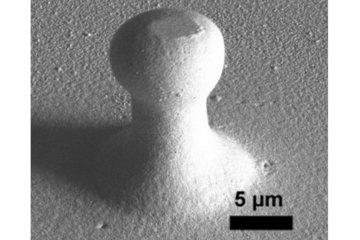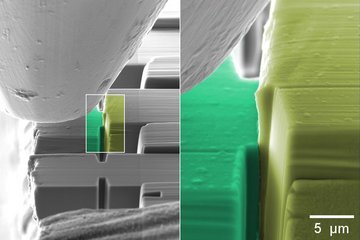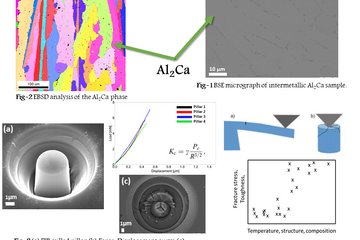All genres
221.
Talk
Ab-initio based multi-scale approaches to the elasticity of polycrystals. Mid-term COST conference on Multiscale Modeling of Materials, COST action 19, Brno, Czech Republic (2008)
222.
Talk
Ab initio study of the alpha-iron stability limits. Ab initio Description of Iron and Steel: Magnetism and Phase diagrams (ADIS 2008), Ringberg castle, Tegernsee, Germany (2008)
223.
Talk
Effect of interstitial carbon on the magnetic structure of fcc iron: Towards an ab-initio simulation of austenitic steels. International Workshop on Ab initio Description of Iron and Steel (ADIS2008), Ringberg Castle, Germany (2008)
224.
Talk
Using ab initio Simulations in Texture Research. 15th International Conference on the Texture of Materials (ICOTOM 15), Pittsburgh, PA, USA (2008)
225.
Talk
Modeling Rolling Textures of Beta Ti Alloys Using Constitutive Data From Ab-initio Simulations. 15 th International Conference on the Texture of Materials (ICOTOM 15), Pittsburgh, PA, USA (2008)
226.
Talk
Texture Evolution during Casting and Hot Rolling of a β-Ti-Nb alloy. 15th International Conference on the Texture of Materials (ICOTOM 15), Carnegie Mellon University Center, Pittsburgh, PA, USA (2008)
227.
Talk
Using Density Functional Theory to Predict Material Properties of Alloy and Biological Systems. Invited talk at University of Groningen, Department of Biomedical Engineering, Groningen, The Netherlands (2008)
228.
Talk
Using DFT to Predict Mechanical Properties of MgLi Alloys. APS Meeting, New Orleans, LA, USA (2008)
229.
Talk
Using Ab Initio to Predict Engineering Parameters in bcc Magnesium-Lithium Alloys. American Physics Society March Meeting, New Orleans, LA, USA (2008)
230.
Talk
Using DFT to Predict Mechanical Properties of MgLi Alloys. DPG Meeting, Berlin, Germany (2008)
231.
Talk
Ab initio analysis of the carbon solubility limits in various iron phases. Spring meeting of the German Physical Society (DPG), Berlin, Germany (2008)
232.
Talk
An ab-initio study of the hydrogen-bond network in crystalline alpha-chitin. Spring meeting of the German Physical Society (DPG), Berlin, Germany (2008)
233.
Talk
An ab-initio study of the phase transitions in the interstitial Fe–C solid solutions. Spring meeting of the German Physical Society (DPG), Berlin, Germany (2008)
234.
Talk
Using Ab Initio to Predict Engineering Parameters in bcc Magnesium-Lithium Alloys. Deutsche Physikalische Gesellschaft Meeting, Berlin, Germany (2008)
235.
Talk
First-principle study of materials properties in metallic alloys. German-Korean miniworkshop, MPI für Eisenforschung GmbH, Düsseldorf, Germany (2008)
236.
Talk
Eigenspannungen am Hummerexoskelett. Sitzung des FA 13 Eigenspannungen am AWT, IFW Dresden, Germany (2007)
237.
Talk
Orientation patterning below indents and Bottom-up mechanical design by using quantum mechanics. Symposium Multiscale Plasticity of Crystalline Materials of the International Union of Theoretical and Applied Mechanics (IUTAM), TU Eindhoven, The Netherlands (2007)
238.
Talk
Phase stability and mechanical properties of alloys. International Max-Planck Workshop on Multiscale Modeling of Condensed Matter, Sant Feliu de Guixols, Spain (2007)
239.
Talk
First principles study of the anomalous volume-composition effect in Fe-Al and Fe-Ga alloys. 4th Discussion Meeting on the Development of Innovative Iron Aluminum Alloys, Interlaken, Switzerland (2007)
240.
Talk
Ab initio study of the thermodynamics and elasticity in polycrystals. PAW workshop 2007, Goslar, Germany (2007)











